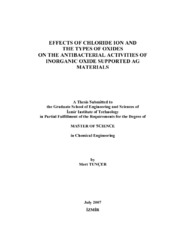Please use this identifier to cite or link to this item:
https://hdl.handle.net/11147/3808| Title: | Effects of Chloride Ion and the Types of Oxides on the Antibacterial Activities of Inorganic Oxide Supported Ag Materials | Authors: | Tunçer, Mert | Advisors: | Şeker, Erol | Publisher: | Izmir Institute of Technology | Abstract: | This study deals with the silver containing oxide supported materials and their antibacterial efficacies. Major goal of this study is to prepare silver chloride nano crystals on oxide supports to provide a long.lasting protection due to the slow and controlled release of silver ions from the materials. Two oxide supports, titanium dioxide and zinc oxide . silica matrices were synthesized via a sol-gel route which allows one to easily tailor textural and chemical properties. Two approaches were followed to form AgCl containing materials; to synthesize AgCl containing materials in a single step sol . gel route and to form AgCl in the materials by HCl treatment of metallic Ag containing oxide materials. The characterization of the samples were performed by using XRD, SEM, and BET techniques. Antibacterial efficacies of the powders were investigated by disk diffusion (zone inhibition) method against Gram negative E. coli bacteria. In the antibacterial activity tests, the powders containing metallic Ag and/or AgCl nano crystals were compared with the repeated usage to study the feasibility of their long term protection. In this study, it was found that AgCl nano-crytals containing samples showed a larger zone of inhibition than Ag containing samples in the standard media whose ingredient.s inhibitory effect on the antibacterial activity is the lowest. However, in the high broth containing media, metallic Ag nano-crystals containing samples showed higher zone of inhibition than AgCl containing samples which reveals the dependence of antibacterial activity on the type of media. In ZnO . SiO2 samples, the highest antibacterial activity was found unexpectedly at the lowest ZnO concentration. Moreover, Ag containing ZnO . SiO2 was found to be more active than Ag containing TiO2 samples. As the antibacterial tested samples were investigated by XRD, it was seen that Ag crystals were formed into AgCl crystal because of the Cl ions present in the broth media. AgCl formation indicates that there is an interaction between the content of growth media and the antibacterial materials. | Description: | Thesis (Master)--Izmir Institute of Technology, Chemical Engineering, Izmir, 2007 Includes bibliographical references (leaves: 58-63) Text in English; Abstract: Turkish and English x, 69 leaves |
URI: | http://hdl.handle.net/11147/3808 |
| Appears in Collections: | Master Degree / Yüksek Lisans Tezleri |
Files in This Item:
| File | Description | Size | Format | |
|---|---|---|---|---|
| T000626.pdf | MasterThesis | 2 MB | Adobe PDF |  View/Open |
CORE Recommender
Page view(s)
224
checked on Dec 23, 2024
Download(s)
82
checked on Dec 23, 2024
Google ScholarTM
Check
Items in GCRIS Repository are protected by copyright, with all rights reserved, unless otherwise indicated.